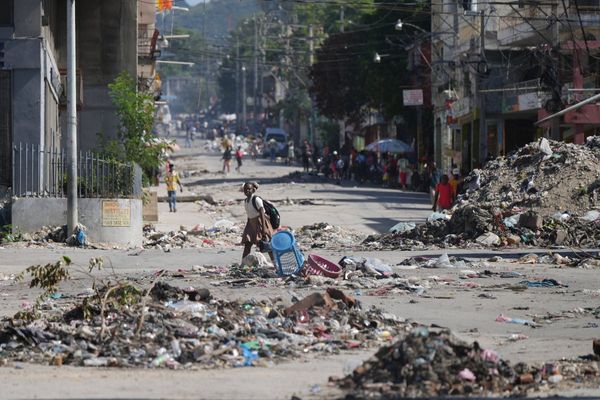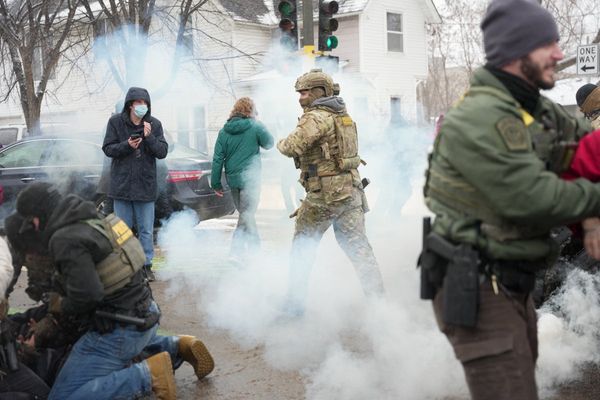
Civil liberties advocates are warning that the Trump administration’s decision to strip visas from at least six foreign nationals over social media posts about Charlie Kirk’s killing represents yet another example of dangerous government crackdowns on protected speech.
On Tuesday, the state department announced it was systematically identifying visa holders who “celebrated the heinous assassination of Charlie Kirk”, declaring in a social media statement that “the United States has no obligation to host foreigners who wish death on Americans”.
The visa cancellations represent an escalating government-wide campaign to suppress criticism of Kirk, who was killed last month. The administration cut visas for nationals from Argentina, South Africa, Mexico, Brazil, Germany and Paraguay.
“You can’t defend ‘our culture’ by eroding the very cornerstone of what America stands for: freedom of speech and thought,” Conor Fitzpatrick, an attorney at the Foundation for Individual Rights and Expression (Fire) said in a statement to the Guardian. “The Trump administration must stop punishing people for their opinions alone.”
Visa revocations under these parameters “are censorship, plain and simple”, Carrie DeCell, Knight First Amendment Institute’s senior staff attorney and legislative adviser, said in a press release.
“Mere ‘mockery’ can’t be grounds for adverse government action – whether revocation of broadcast licenses or revocation of visas,” DeCell said. “While the government can revoke visas for many reasons, the First Amendment forbids it from doing so based on viewpoint.”
The crackdown has ensnared foreign nationals for posts with minimal reach, raising questions about the extent of government surveillance of social media activity. Among those whose visas were revoked was a South African national whose commentary attracted just 2,344 views. The individual “mocked Americans grieving the loss of Kirk, saying ‘they’re hurt that the racist rally ended in attempted martyrdom’ and alleging ‘he was used to astroturf a movement of white nationalist trailer trash’”, according to the state department.
A German national also had their visa cancelled for a post written in German that translated to: “when fascists die, democrats don’t complain.” The state department characterized this as celebrating Kirk’s death and attempting to justify his murder.
The Brazilian stripped of his US visa is Tiago Santineli, a far-left standup comedian and online influencer who published a series of inflammatory tweets about Charlie Kirk after his assassination.
In one 16 September post, cited by the state department on Monday, the 33-year-old comedian, who has more than 430,000 X followers, wrote: “Charlie Kirk was the reason for a Nazi demonstration where they marched in tribute to him. Good riddance!”
In a second part of the tweet, not cited by the state department, Santineli refers to the fatal shot to Kirk’s neck, writing: “If only someone had given Hitler this kind of tracheostomy before he had reached power. It’s too bad that Little Charlie Deep Throat was killed by another by another right-wing conservative, it takes a bit of the fun out of it, but it’s still worth it.”
The controversial Brasília-born comedian, who has nearly a million YouTube subscribers, published several other incendiary messages about Kirk’s 10 September assassination. In one 18 September post, Santineli wrote beneath a photo of two well-known rightwing Brazilian politicians: “When are these [two] going to get the charlie kirk treatment?”
Santineli did not reply to a request for comment but writing on X on 1 October he said he had received an email from the US embassy revoking his visa. The Brazilian boasted that that made him “the world’s first comedian to be banned from entering the US because of a joke”. “I can’t go to the US,” Santineli wrote. “But the worst thing is that Charlie Kirk will never be able to leave hahahahahahahahaha.”
Another person singled out by the visa restrictions was Enrique “Kike” Gamarra, a veteran talkshow host who is often critical of Paraguay’s conservative government. In a recent programme, Gamarra said that Kirk’s killing “doesn’t absolve the way he lived his life. Charlie Kirk was a son of a bitch and died according to his own rules.” Gamarra declined to comment when contacted by the Guardian.
Pro-government media in Paraguay celebrated the travel ban imposed on the broadcaster, which comes amid deepening ties between Trump’s White House and Paraguay’s president, Santiago Peña.
The state department’s actions draw on a vast surveillance apparatus established in 2019, when the department began requiring nearly all visa applicants worldwide to provide social media handles from platforms including Twitter/X, Facebook, Instagram, YouTube, LinkedIn and Reddit used within the past five years.
The policy, adopted under Trump’s first administration as part of “extreme vetting” measures, continued under Joe Biden, and expanded dramatically in March this year. A state department cable obtained by the Guardian at the time ordered consular offices to conduct comprehensive social media investigations of student visa applicants, with officers instructed to preserve screenshots of “potentially derogatory” content to create permanent records – even if posts were altered or deleted.
The March directive established sweeping new grounds for visa denials, writing that “evidence that an applicant advocates for terrorist activity, or otherwise demonstrates a degree of public approval or public advocacy for terrorist activity or a terrorist organization” could justify rejection.
It also mandated social media reviews of all students applying for visas, with fraud prevention units directed to flag and document content the administration deems threatening to national security.
The directive followed high-profile visa revocations and arrests targeting pro-Palestinian campus activism, signaling an aggressive expansion of how immigration enforcement could be wielded against political speech.
“The supreme court has been clear that noncitizens have a right to freedom of speech” Fitzpatrick said. “In America, no one should fear a midnight knock at the door because of their political views.”







